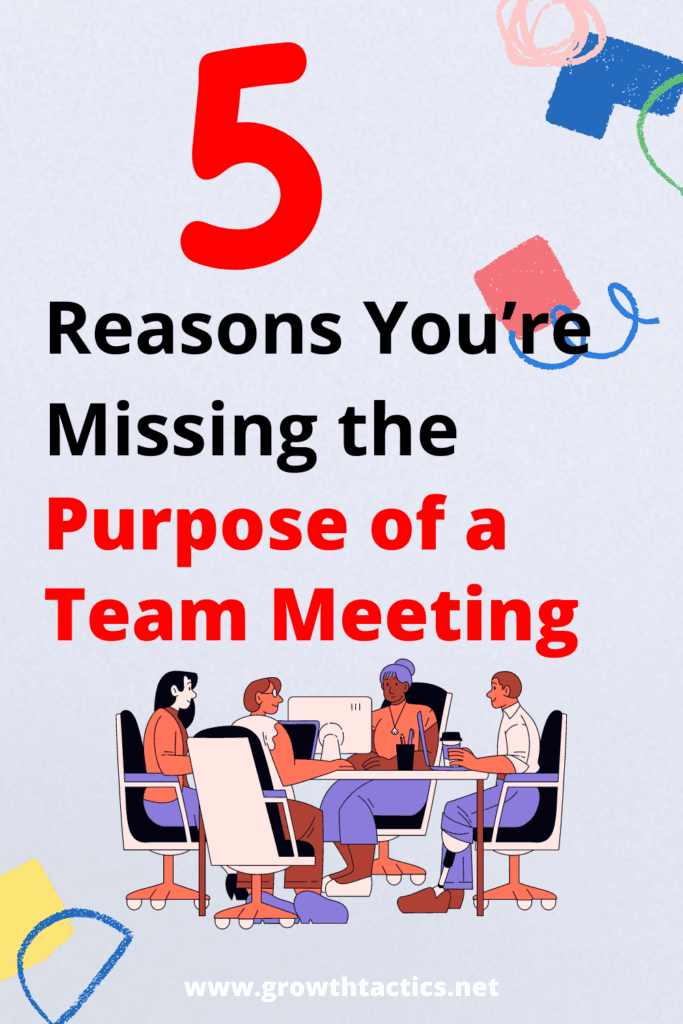Are your team meetings just a boring ritual? Do you find yourself checking the clock, waiting for it to end? You’re not alone. Many of us go through the motions, missing the real power of these gatherings.
But here’s the thing: team meetings can be game-changers when done right. They’re not just about ticking boxes or sharing updates. They’re golden opportunities to spark creativity, build stronger bonds, and drive your team forward.
In this article, we’ll uncover five reasons why you might be missing the true purpose of a team meeting. Get ready to transform your meetings from dull to dynamic!
Jump To Section
Reason 1: Focusing Solely on Status Updates
Let’s be honest, we’ve all been in those meetings where it feels like a never-ending parade of status updates. “I did this,” “I’m working on that,” rinse and repeat. But here’s the kicker: if that’s all your team meetings are about, you’re missing the point entirely.
Don’t get me wrong, status updates have their place. They keep everyone in the loop. But if that’s the main course of your meeting menu, you’re serving up a pretty bland dish.
Think about it. When was the last time a simple status update sparked a great idea or solved a tricky problem? Probably never, right?
The real magic happens when you use these updates as a jumping-off point. They should be the appetizer, not the main course. Use them to dig deeper. Ask questions like, “What’s holding you back?” or “How can we help you move forward?”
When you shift from just reporting to actively problem-solving, that’s when the real teamwork begins. Suddenly, your marketing whiz might have the perfect solution for your IT team’s roadblock. Or your newest team member could bring a fresh perspective to an old challenge.
Remember, your team is more than just a group of individual workers. You’re a collective brain trust. By focusing solely on status updates, you’re leaving all that collective wisdom untapped.
So, next time you’re in a team meeting, try to move beyond the “what” and dive into the “how” and “why.” You might be surprised at the gems of insight and collaboration you uncover.
Reason 2: Neglecting Team Building and Bonding
Let’s face it, your team isn’t just a bunch of robots churning out work. They’re real people with personalities, and quirks, and lives outside the office. But how often do your team meetings tap into that human element? If your answer is “rarely” or “never,” you’re missing a huge opportunity.
Team building isn’t just feel-good fluff. It’s the secret sauce that can take your team from good to great. When people know and trust each other, magic happens. They communicate better, collaborate more easily, and even enjoy coming to work more.
Now, I’m not saying you need to turn every meeting into a group hug session. But sprinkling in some team-building activities can work wonders. It could be as simple as starting each meeting with a quick icebreaker question. “What’s the best movie you’ve seen lately?” or “If you could have any superpower, what would it be?” These little moments help people connect on a personal level.
Or how about dedicating the last 10 minutes of each meeting to something fun? Maybe a quick brainstorming game or a silly team challenge. It might seem like you’re “wasting” time, but you’re actually investing in your team’s cohesion.
Remember, a team that laughs together, works better together. When people feel connected to their coworkers, they’re more likely to speak up, share ideas, and go the extra mile for each other.
So, next time you’re planning a team meeting, don’t just focus on the work stuff. Make room for some bonding time too. Your team (and your results) will thank you for it.
Reason 3: Failing to Align with Organizational Objectives
Picture this: Your team is working hard, cranking out projects left and right. Everyone’s busy, and you’re having regular meetings. Sounds great, right? But here’s the million-dollar question: Are all these efforts actually moving your organization forward?
Too often, teams get caught up in their own little bubble. They focus on their immediate tasks without considering the bigger picture. It’s like rowing a boat really fast but forgetting to check if you’re heading in the right direction.
This is where aligning with organizational objectives comes in. It’s not just corporate jargon – it’s about making sure your team’s work actually matters in the grand scheme of things.
Think of it this way: Your organization has goals, big dreams it wants to achieve. Maybe it’s increasing sales by 20%, launching a new product line, or becoming more eco-friendly. Whatever these goals are, your team needs to know about them and understand how their work contributes.
Use your team meetings to revisit these objectives regularly. Ask questions like, “How does this project help us reach our company’s goals?” or “Are we focusing on the right priorities?” This doesn’t mean micromanaging every task. It’s about giving your team the context they need to make smart decisions.
When your team understands the ‘why’ behind their work, amazing things happen. They become more engaged, more innovative, and more likely to spot opportunities that others might miss.
So, next time you’re in a team meeting, take a moment to connect the dots between your team’s efforts and the organization’s big-picture goals. It might just be the reality check your team needs to supercharge their impact.
Reason 4: Overlooking the Opportunity for Skill Development
Let’s talk about something that often gets pushed to the back burner in team meetings: learning new skills. We’re all so focused on getting stuff done that we forget about helping our team grow. But here’s the thing – your team meetings can be a goldmine for skill development.
Think about it. You’ve got a group of people with different strengths and experiences all in one room (or Zoom call). Why not tap into that wealth of knowledge?
Now, I’m not saying you should turn your team meetings into full-blown training sessions. But what if you set aside just 10 minutes in each meeting for someone to share a skill or a cool trick they’ve learned? It could be anything from a time-saving Excel hack to a new project management technique.
Or how about this – start a “challenge of the week” where team members practice a specific skill and share their progress in the next meeting. It could be public speaking, data visualization, or even creative problem-solving. The point is to make learning a regular part of your team’s routine.
Remember, when your team members learn new skills, everyone wins. They feel more valued and engaged, and your team becomes more versatile and efficient.
Plus, let’s face it – learning something new breaks up the monotony of regular meetings. It adds a spark of excitement and gives people something to look forward to.
So, next time you’re planning a team meeting, ask yourself: “What can my team learn today?” It might just be the secret ingredient that takes your meetings from dull to dynamic.
Reason 5: Ignoring the Power of Collective Creativity
Let’s talk about creativity. No, I don’t mean painting masterpieces or writing poetry (though if that’s your thing, go for it!). I’m talking about the kind of creativity that solves problems and sparks innovation. And guess what? Your team meetings are the perfect place to unleash this superpower.
Too often, we treat team meetings like a one-way street. The boss talks, everyone nods, and that’s that. But here’s the thing: when you do this, you’re leaving a ton of great ideas on the table.
Think about it. You’ve got a room full of smart people with different perspectives and experiences. Why not tap into that goldmine of creativity?
Try this: Next time you face a tricky problem, don’t just announce your solution. Instead, throw it out to the team. Ask, “What ideas do you have?” You might be surprised at the creative solutions that pop up.
Or how about a quick brainstorming session in each meeting? Set a timer for five minutes and let everyone shout out ideas for a current project or challenge. No idea is too wild – in fact, the crazier, the better!
Remember, creativity loves company. When people bounce ideas off each other, magic happens. One person’s “out there” suggestion might spark a brilliant idea in someone else.
Plus, when team members see their ideas valued and implemented, they become more engaged and invested in their work. It’s a win-win situation.
So, stop treating your team meetings like a lecture hall. Turn them into creativity hubs instead. You’ve got all this brainpower in one place – use it! Who knows? The next big breakthrough for your team or company might come from that “crazy idea” someone shares in your next meeting.
Wrapping It Up: Time to Shake Up Your Team Meetings
So, there you have it – five big reasons why your team meetings might be missing the mark. But don’t worry, it’s not too late to turn things around!
Remember, team meetings aren’t just about ticking boxes or running through to-do lists. They’re your chance to build a stronger, more connected, and more creative team. They’re where you can foster real collaboration, spark new ideas, and help your team grow.
Think about it: What if your next team meeting was the one where someone shared an idea that changed everything? Or where team members left feeling truly heard and valued? Or where everyone learned something new that made their work easier?
It’s all possible. All it takes is a shift in how you approach these meetings. Focus on building relationships, encouraging open communication, and tapping into your team’s collective brainpower. Make room for learning and creativity. And most importantly, remember that every person in that meeting has something valuable to contribute.
So, are you ready to shake things up? Your next team meeting could be the start of something amazing. Go on, give it a try. Your team (and your results) will thank you for it.
Now, I’d love to hear from you. What’s one thing you’re going to try in your next team meeting? Drop a comment below and let’s keep this conversation going!


